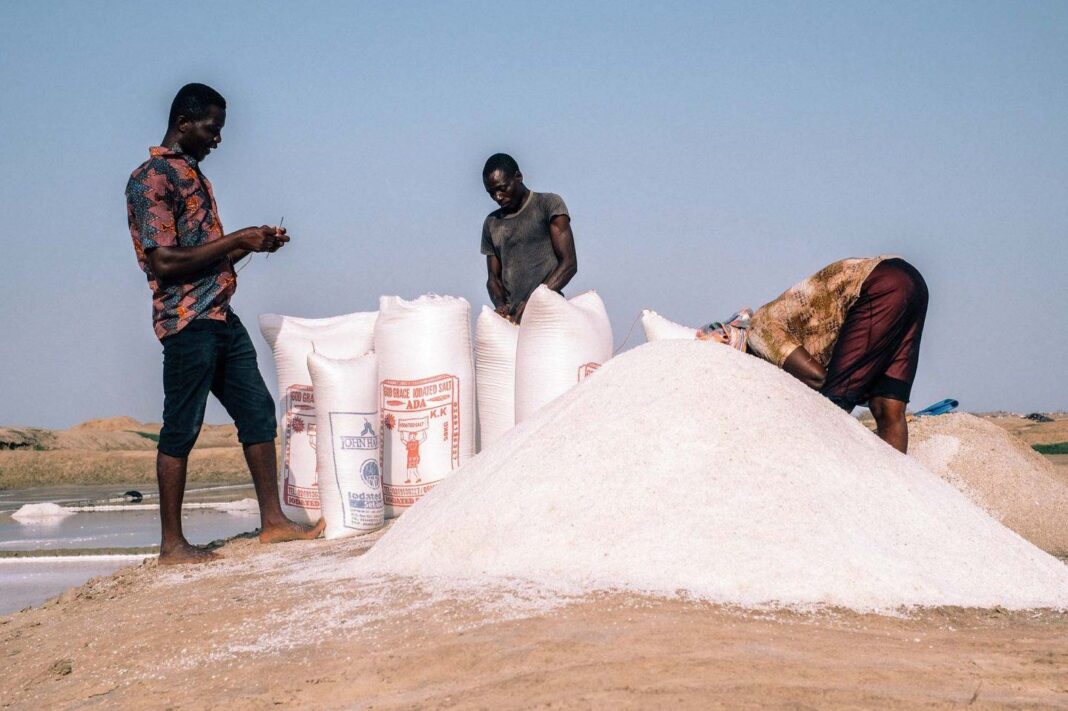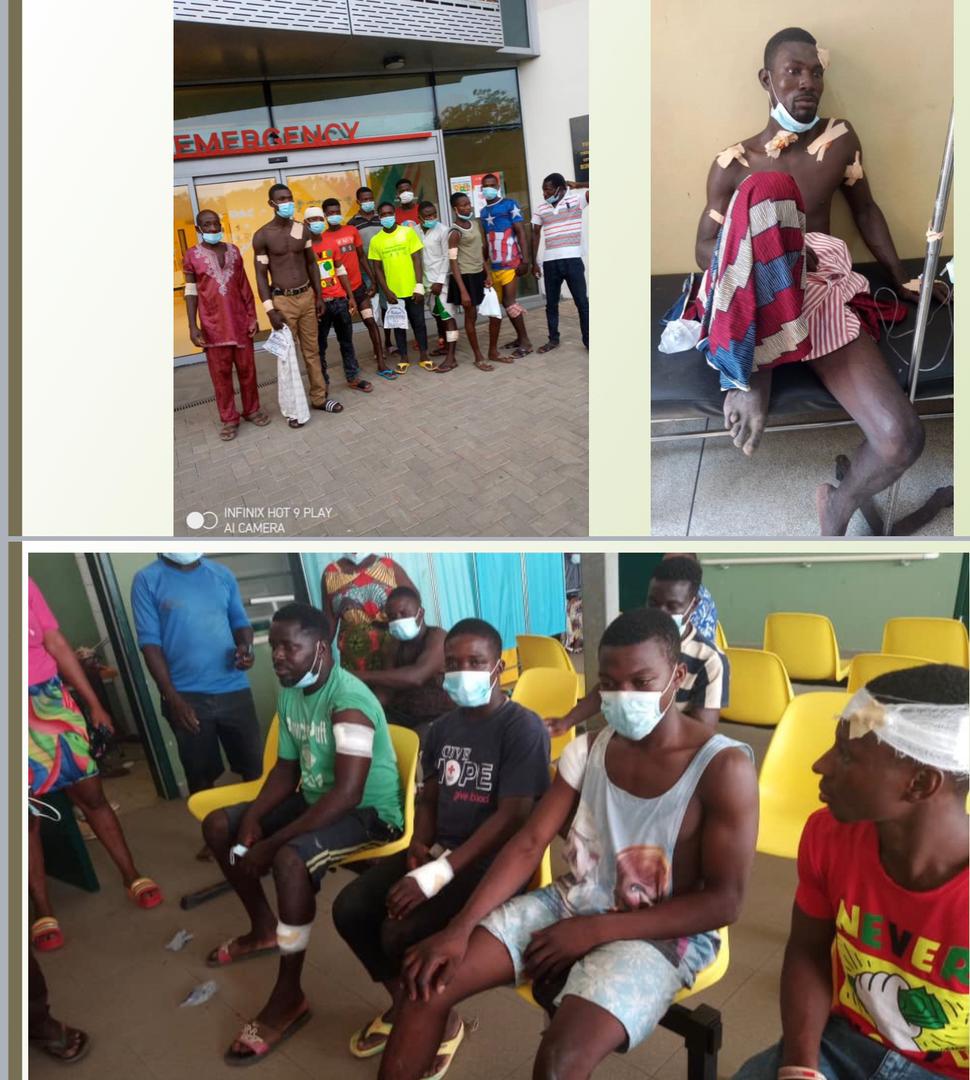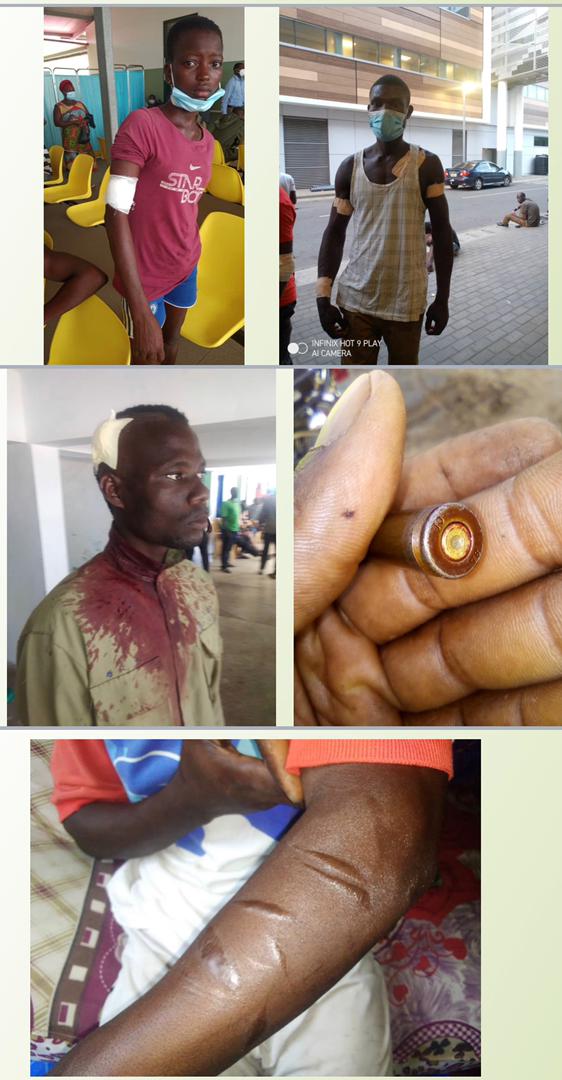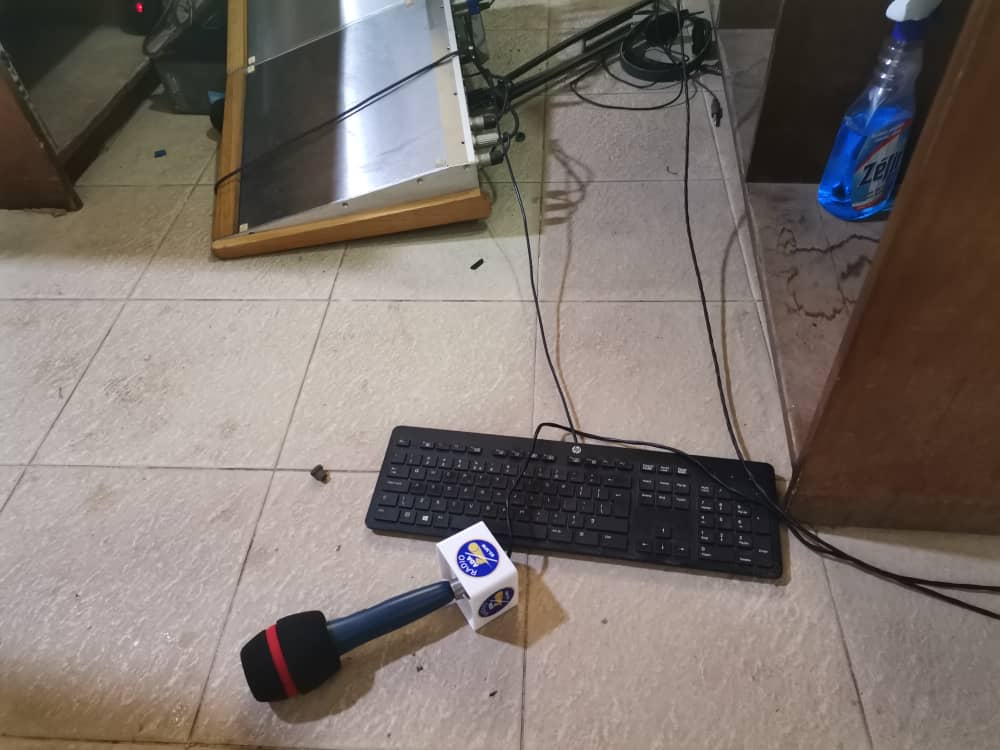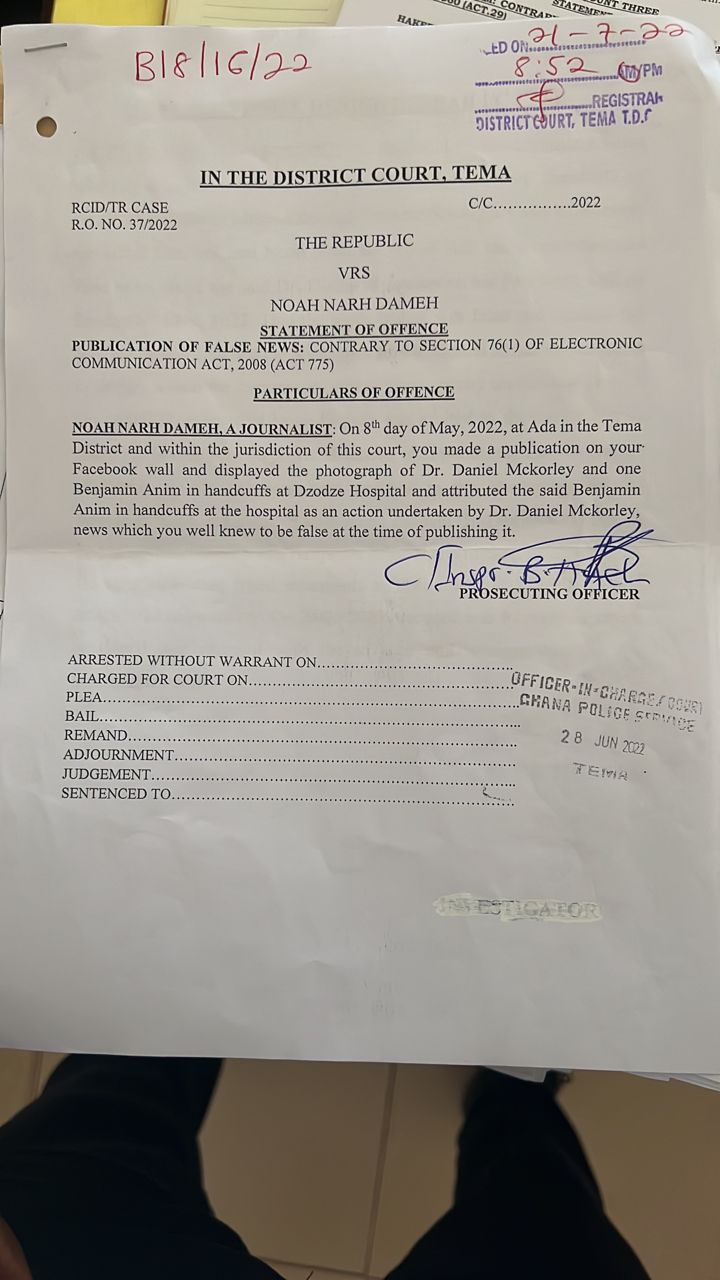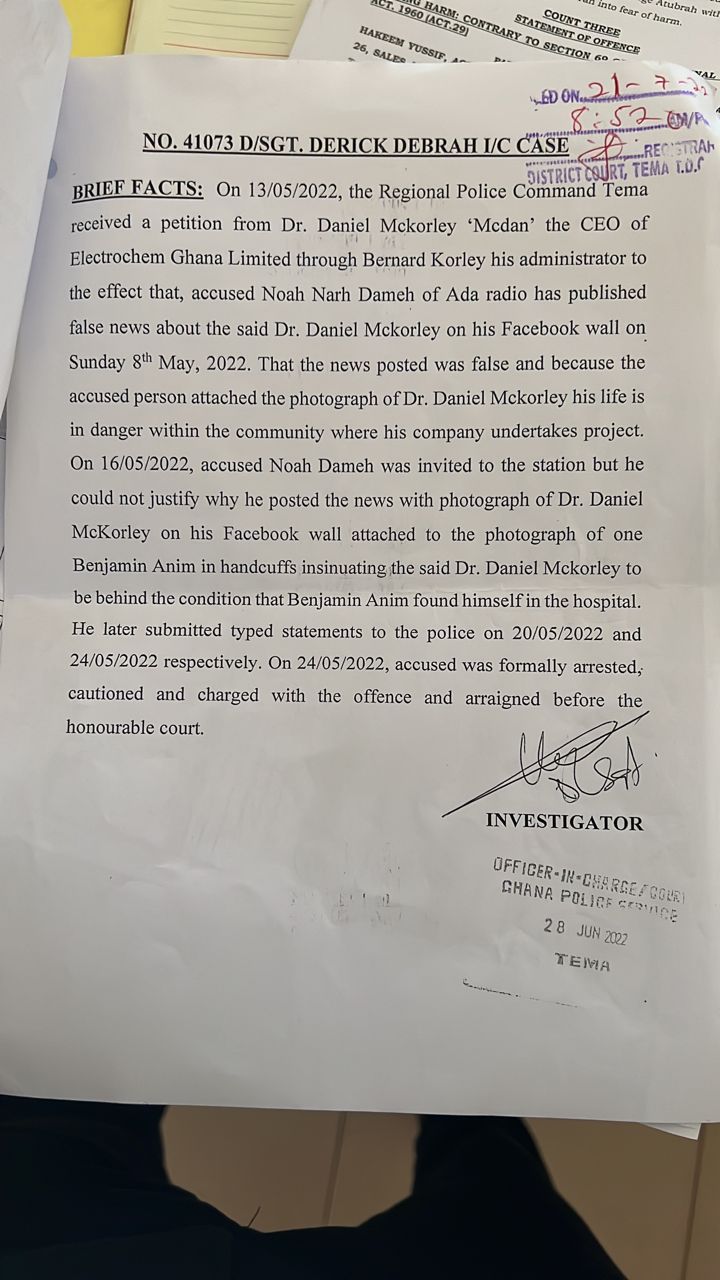The woes of Noah started with a text he received on his phone on the morning of May 14, 2022. It was a message from a Sergeant at the Criminal Investigations Department (CID) of the Police Command in Tema in the Greater Accra Region inviting him to the station.
Noah replied to the text with a phone call.
“I enquired from the Sergeant why he is inviting me. He said it was about my Facebook post on inhumane acts,” he recalled.
Noah Narh Dameh is a journalist and the deputy station coordinator of Radio Ada, a community radio station in the Greater Accra Region. He had made a post on Facebook deploring how the activities of a private salt-mining company, Electrochem Ghana Limited (EGL), and its owner, Dr Daniel Mckorley (also known McDan), were denying the indigenes of Ada their livelihoods and infringing on their rights.
The post, published on May 8, was accompanied by a photo collage of McDan and a man with an injured hand handcuffed to a hospital bed. It bore the inscription – “Stop the inhuman act!!! Macdan.”’
On May 16, Noah Dameh honoured the invitation by the police. He was informed that Dr Mckorley had lodged a complaint that he had published false information about him (McDan) and his company.
“The Sergeant queried why I had made a post about a renowned businessman of the stature of Dr Mckorley without fearing,” Noah recalled. “They also asked me to write all I know about Benjamin Anim, the man handcuffed in the photo.”
Three days later when Noah Dameh returned to the police station upon the request of the officers, he was arrested and detained for nearly six hours. This was after he denied the police’s accusation of being guilty to the charges of false publication.
Having been granted bail of GHs 20,000 (about US$ 2,000) with two sureties, Noah is currently standing trial on criminal charges of publishing false information. He has since been made to report to the police every week.
Noah Dameh’s ordeal is an episode of a running series of human rights abuses, press freedom breaches and safety of journalists’ issues concerning a community radio station, residents of Ada, and their right to protest against a private salt mining company, Electrochem Ghana Limited (EGL).
The Genesis – A controversial black-boxed mining lease to a green firm
Located on the southeast coast of Ghana, where the Volta River meets the Atlantic Ocean, Ada is home to the second largest lagoon in the country- Songhor. The Songhor lagoon is hailed as the richest salt mine in West Africa and holds about half of Ghana’s salt deposits.
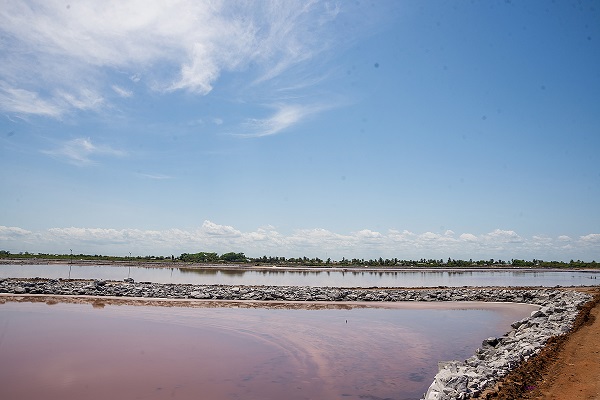
For centuries, about 50 communities located in the Ada settlement areas have had salt mining as their primary source of livelihood. The State has also always been interested in the rich salt resource for commercial and large-scale industrial mining purposes. Unfortunately, that interest in recent history has been soiled with stories of violence, brutality and death.
The most perceptible violent history of the commercial mining of the Songhor lagoon in recent times traces to May 1985 when a dispute between the Ada Traditional leaders and a private mining company, Vacuum Salt Limited (VSL), resulted in the killing of a pregnant woman called Margaret Kuwornu (also known as Maggie).
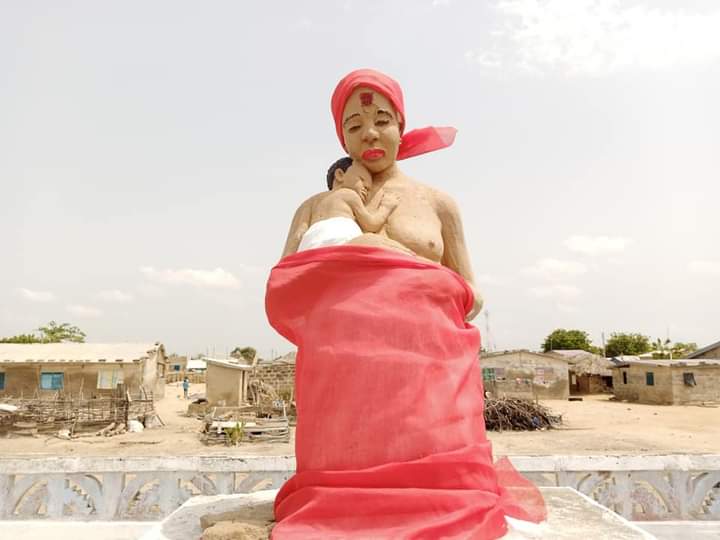
Vacuum Salt Limited, owned by businessman S. C. Appenteng, had been granted a long-term lease to mine a portion of the lagoon by the military junta of 1971. But the lease terms were unclear, at least to the traditional leaders and clan heads who were original owners of the salt resource. VSL operations were said to be disrupting the livelihoods and concessionaries of other miners, resulting in a long period of conflict.
The bloody clashes resulted in the nationalization of the Songhor Lagoon. This followed recommendations from a commission (Amissah Commission) established to provide guidance on the management of the Songhor lagoon after the bloody clash that maimed many and killed pregnant Maggie. The Commission annulled all private mining concessions including VSL’s concession area covering 50 sq. km (12,428 acres) – later handed over to an interim government-operated Ada Songhor Salt Limited Company. The Commission recommended an inclusive system for salt production on the Songhor Lagoon, organized for the benefit of both local/Associations of Salt Miners (ASM) and large-scale operators.
The work of the Commission led to the passage of PNDC Law 287 and the Master Plan that provides a framework for salt mining in Ghana in 1991. The Law enjoined the government to hold the Songhor Lagoon and its adjourning lands in trust of the people in Ada.
It is on this foregoing background that Ghana’s Parliament in November 2020 ratified a 15-year mining lease agreement with Electrochem Ghana Limited (EGL) for a large-scale commercial salt mining project on the Songhor Lagoon. EGL belongs to the McDan Group of Companies, a freight transport company in Ghana.
But this lease agreement did not lack any of the controversies in the previous agreement – it perhaps had more. The agreement lacked inclusivity and failed to integrate the interests and concerns of stakeholders in the Songhor Lagoon. This includes the local associations of Salt Miners (ASM) who, according to the Amissah Commission, must be key parties in such large-scale mining agreements.
For instance, one of the documents the MFWA obtained with regard to the mining lease was a memorandum of understanding (MOU) between McDan and heads of clans in the Ada settlement areas. However, the Salt Priest (Libi Wornor), Numo Amate Apedo Ayornu, who plays the role of a spiritual head over the Songhor Lagoon, considered a deity by the community, is reported to have been kept in the dark in the signing of the MOU.
For the many stakeholders and experts in the mining of natural resources, the EGL Songhor salt project which covers a total of 158.4 sq. km (39,141.5 acres) is nothing short of a monopoly. The project, they agree, is significantly more than the VSL concession and government-owned salt project.
A copy of the lease document the MFWA has sighted indicates the indigenes in Ada who for centuries have depended on salt mining as their livelihoods are only permitted space on the lagoon for their traditional rituals, hunting of game, collection of firewood and, at best, a concession for subsistence salt mining.
The lease has courted fierce opposition and erupted outright rage among the residents in the communities in Ada who have labelled the agreement as opaque, unfair, immoral and holds no hope for the future of Ada residents.
“By very unfair means McDan managed to obtain access covering the whole of the Songor Lagoon and its adjoining lands stretching from Nakom-kope in the west to Elavanyo in the east; a total of 158.34 Sq. Km, contrary to the provisions of PNDC law 287. Thereby depriving over 35,000 small-scale sea salt producers of their livelihood and leaving no opportunity whatsoever for any of our sons and daughters,” the Ada Songhor Lagoon Association said in its August 2022 newsletter.
After studying the lease agreement and business development plan based on which the government of Ghana leased the Songhor lagoon to the EGL, Third World Network (TWN) Africa, an NGO which specializes in resource extraction, agree with the aggrieved residents of Ada.
“Beyond the redevelopment of the old nationalised large scale, primarily VSL, salt works, covering the 32 sq. km of the Area A lease, there is no indication of a firm and credible development/investment plan that justifies the government handing over the whole Songor Lagoon to Electrochem,” Third World Network (TWN) Africa noted in a paper that analyses the Songhor lagoon situation.
For the citizen groups and associations, the master plan and the PNDC law established to guide the mining of salt have been jettisoned.
The TWN-Africa is particularly worried that a monopoly of such magnitude that affects the daily sustenance of a large number of people has been left in the hands of a company that has no proven track record or experience in large-scale salt mining.
Irate residents, brutal security forces
As expected, the teeming residents in the Ada communities who no longer have access to their livelihoods-at least as before-have been protesting. Some of these protests have degenerated into clashes with the police. The police have, sadly, responded with as much brutality as the protests.
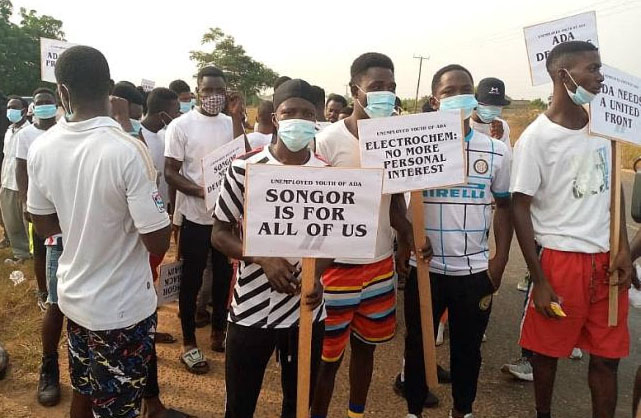
On February 5, 2021, when EGL commenced its operations, the youth in the communities protested at the premises of the company. This resulted in brawls, arrests and shootings by the police and armed thugs, reportedly hired by the EGL, against the protestors.
The protests have since continued with each encounter further underlining the police’s negligence and irresponsibility in protecting human lives, contrasted with their commitment to protecting the business interests of the EGL.
Protestors’ life under siege
While there have been no deaths recorded yet, a considerable number of protestors have sustained varying degrees of injuries. Some are also standing trial in courts.
One of the victims, Sampson Agbovie, sustained gunshot wounds from the thugs and the police. He says he has bullet pellets tucked in his body.
The residents narrate that after each protest, the police conduct regular swoops in the communities in a bid to arrest the leaders and critical voices in the demonstrations. One of such incidents led to the arrest of Benjamin Anim.
Benjamin Anim had sustained an injury on his hand after he defended some community members who were being forced into a car after being accosted by machomen believed to be guards of the EGL and police officers on May 16, 2021. While seeking healthcare in the hospital, the Officers rounded his ward and handcuffed him to the bed.
For about five weeks while Benjamin Anim sought healthcare at the hospital, the police reportedly denied him the right to movement including using the washroom. It left him with serious sore patches around his wrist where the handcuffs clamped to the bed.
After being discharged from the health facility, Anim was further detained in a police cell in the community for a day and later transferred to Tema police command where he was charged before a court together with other community members who were standing trial for allegedly destroying properties belonging to EGL.
Benjamin Anim’s story is the basis for the false publication charges against Noah Dameh.
The attack and persecution of Radio Ada
The bloody clashes, arrests, human rights abuses and rumours have created tension and deep mistrust among the residents and traditional authorities in Ada who are divided on whether to oppose or support EGL’s mining activities.
The conflicts would have been further draped with falsehood and disinformation, but for Radio Ada’s campaign, shedding light on the matter and ensuring transparency through its programme.
One of the foremost community radio stations in the Ada settlement area, Radio Ada, through its programme “Manor Munyu” (translated to mean “community development issues”) had been interrogating the business plan of EGL, the lease agreements, and their impact on the community residents.
“We began to serialise the documents in a language the community people will understand,” Noah Dameh, lead producer of the programme explained. “When we were about to do the second episode of the programme, one of the chiefs who signed the MOU, Nene Lomo, in the company of the secretary of the paramount chief, came to tell us to stop the programme.”
The management of Radio Ada did not budge. They explained that they were exercising their civic rights by citing public documents for the Manor Munyu programme. To ensure balance, the station invited the chiefs to join the discussions. They refused. And that was the beginning of a sour relationship between the radio station and some of the traditional leaders.
Following the encounter with the Chiefs, Radio Ada, on April 27, 2021, received a letter from the lawyers of Electrochem Ghana Limited (EGL), Farouk Seidu and Associates, instructing them to retract and apologise for some statements made on its programme, Manor Munyu.
“In the circumstances, may I request that you to get the statement made concerning Electrochem Ghana Limited that it is planning to relocate people from the salt wining retracted and followed with an apology,” the letter signed by the lawyers read in part.
The management of the radio station responded through its lawyers, standing its ground and defended the statements on the programme.
After several editions of the programme, a group of thugs numbering about 12 on January 13, 2022, stormed the premises of the community radio station, assaulted two of its journalists and vandalised their facilities and studio equipment including computers and consoles. The station shut down after the attack for almost two weeks.
A statement by the management of the station revealed the motives of the hoodlums, one of whom was armed with a pistol.
“The attackers openly declared that they had come to vandalise the station because of its ‘Manor Munyu’ and other programmes discussing the recent developments in Songhor. They threatened to inflict further havoc should the station continue with programmes on Songhor,” the Management of the radio station stated.
Months after the attack, no significant action has been reported by the police on the thugs who attacked the radio station. What, however, persist is a loggerheads relationship between the traditional leaders and the radio station. The most recent is their denial of the radio station to cover the grand festival of the community, Ada Asafotufiami – an event the station has covered for two decades.
“In the meantime, I am directed to inform you that the Traditional Council has deemed it necessary to place the following restrictions on Radio Ada during this year’s Asafotufiami festival” a letter, dated August 1, signed by the Chairman of the Asafotufiami Festival Planning Committee, Nene Agudey Obichere III, revealed in response to an enquiry made by the radio station on why their name was absent from the media list for the festival.
The letter mentioned three restrictions:
- Radio Ada will not be allowed to mount a stage at Ada Asafotufiami Park.
- Neneme [chiefs] will not grant interviews to journalists from Radio Ada.
- Noah Dameh, Serwah Warri and Amanor Dzeagu who happen to be hosts of programs with an unrefined language towards Neneme are not to be seen at the park in Radio Ada paraphernalia.
According to Noah Dameh, the place where Radio Ada has over the years mounted its stage when covering the grand festival was offered to Eagle FM, a new radio station which had just conducted its test transmission. He said the radio station is owned by Dr Daniel Mckorley (McDan), who owns Electrochem Ghana Limited (EGL).
Noah Dameh is facing criminal charges of publishing false information
Considered the arrowhead of the citizens’ voice and media activism ensuring transparency and accountability in the controversial mining lease, Noah Dameh, Radio Ada’s deputy station coordinator and lead producer of Manor Munyu, would be considered a fierce critic of the business interest of EGL and its owner, Dr Daniel Mckorley (McDan).
His post on Facebook, considered harmless by many, is the grounds for which he’s facing criminal charges of publishing false information.
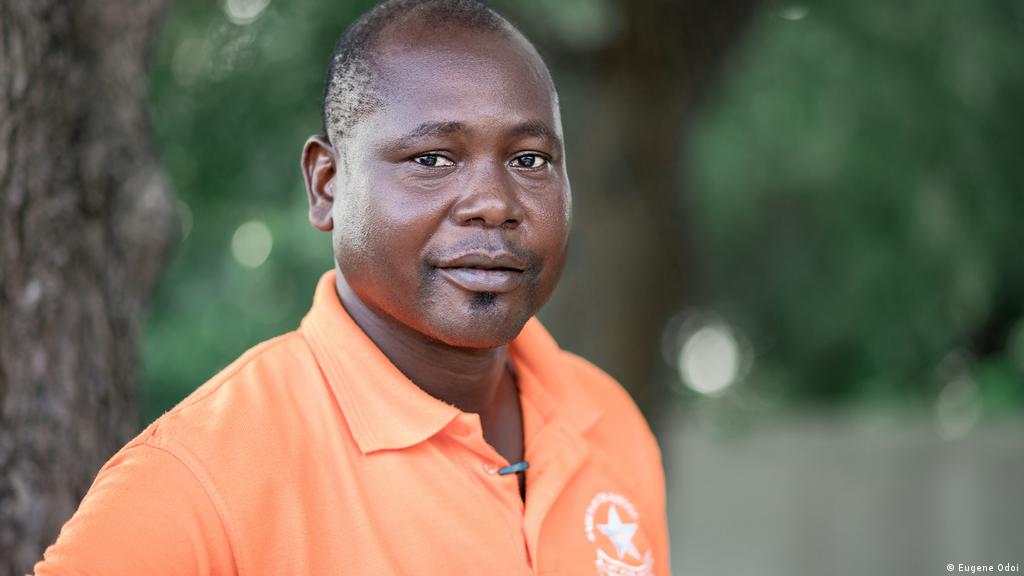
Noah is being charged under section 76(1) of Ghana’s Electronic Communication Act, 2008, Act 775. The provision has been labelled by many media rights advocates including the MFWA as one of the repressive laws in the statute books of Ghana used to silence dissenting voices, especially critical journalists.
He’s not the first journalist being charged with the law, but the latest in a new pattern of criminal charges against journalists and activists in Ghana using false publication laws.
On November 1, 2021, the police arrested and detained a radio presenter, Paa Kwesi Simpson, on charges of publishing false news. The arrest followed a false kidnapping claim made by a listener who called into Simpson’s programme.
On February 10, 2022, the police detained Kwabena Bobbie Ansah, a presenter at Accra FM, on a charge of “publication of false news and offensive conduct”. The charges relate to a video the journalist posted on social media claiming that President Nana Akufo-Addo’s wife had illegally obtained a parcel of state land.
A day before Bobbie Ansah’s arrest, the Executive Director of an anti-corruption organisation, Alliance of Social Equity and Public Accountability (ASEPA), was arrested by the police. He had published and later retracted allegations that members of the President’s family travelled by the Presidential jet to the UK for shopping.
For many press freedom advocates, the impact of the criminal charges of publishing false information against Noah Dameh transcends the journalist’s Facebook post. They believe it’s a menacing caution to his activism, his radio programme and his radio station. It’s one that raises safety of journalists and press freedom concerns.




